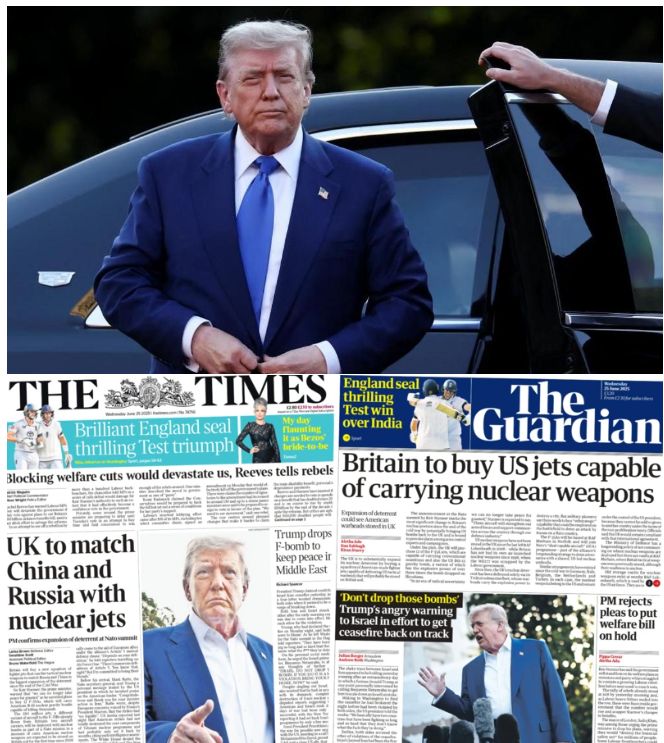NFL
Live Updates: Trump Says U.S. Will Meet With Iran Next Week. Read more⤵️⤵️

President Trump announced the talks as the cease-fire between Israel and Iran entered a second day. It was unclear what format the discussions would take, or if they would lead to limits on Iran’s nuclear program.
Trump’s comments about the conflict between Israel and Iran are scattered across the front page’s of the UK’s papers today.
More specifically, the expletive he used when he accused the two countries of breaching the initial ceasefire.
The Times writes that the US president dropped “the f-bomb to keep peace in the Middle East” while the Guardian refers to his “angry warning” to the two countries on its front page.
President Trump said on Wednesday that the United States and Iran would hold talks “next week,” while also casting doubt on the need to iron out a deal with Tehran about its nuclear program.
As the cease-fire deal between Israel and Iran was holding in its second day, Mr. Trump told reporters at a NATO conference that he didn’t “think it was necessary” for the talks to produce an agreement with Iran, presumably to give up its nuclear ambitions. It is unclear what format any new discussions would take. Secretary of State Marco Rubio said the United States was seeking direct talks between the countries.
“I don’t care if I have an agreement or not,” Mr. Trump said. “The only thing we’d be asking for is what we were asking for before, about we want no nuclear.”
Mr. Trump again argued that the American strikes dealt a devastating blow to Tehran’s ambitions, pushing back forcefully against the findings of a preliminary U.S. intelligence report that said the attacks had only set back Iran’s nuclear program by a matter of months. Mr. Rubio also stepped in with a more detailed case for why he thought the Iranian program had been set back by years.
Israel sought to bolster that argument, releasing a statement from its atomic energy commission that said the American strike on the reinforced Iranian nuclear site at Fordo “destroyed the site’s critical infrastructure and rendered the enrichment facility inoperable.”
The comments by Mr. Trump and his officials were the latest in an effort to portray the 12-day war — the biggest and deadliest ever between Iran and Israel — as a success.
On Wednesday, both Iran and Israel moved to restore a sense of normalcy after nearly two weeks of Israeli airstrikes, waves of retaliatory Iranian ballistic missiles and direct U.S. military involvement in bombing Iran’s nuclear sites.
In Israel, the authorities lifted emergency restrictions that had kept schools and workplaces closed since the beginning of the war, and the country’s busiest airport, Ben Gurion, near Tel Aviv, was expected to fully reopen on Wednesday, allowing thousands of passengers to travel. The Israeli military’s chief of staff, Eyal Zamir, said his country’s focus would now shift back to the campaign against Hamas in Gaza.
In Tehran, supporters of the Iranian government held a victory rally on Tuesday. In a televised address, President Masoud Pezeshkian praised his compatriots for their resilience. He also indicated in a call with the leader of the United Arab Emirates that Iran was ready to resume international talks about its nuclear program, whose destruction was the primary stated aim of the Israeli campaign.











